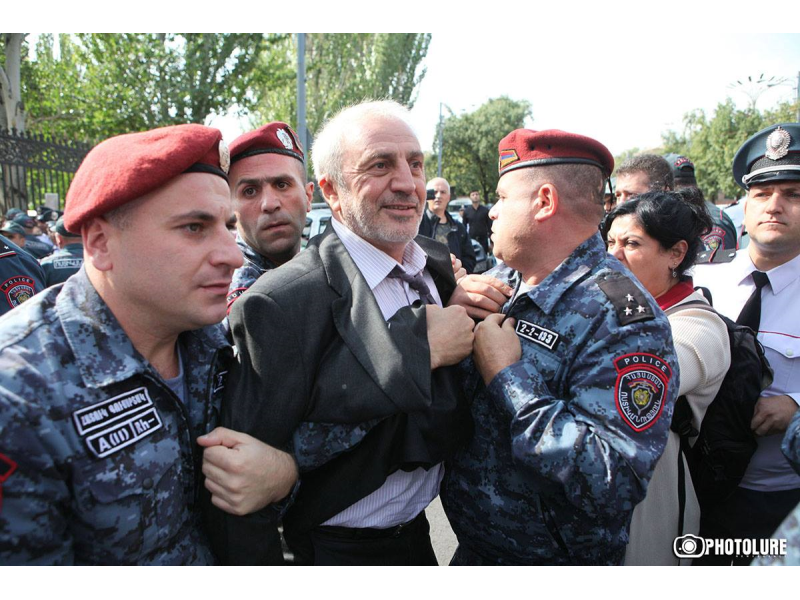Three Steps for Maintaining Power Forever
Since summer, Armenian citizens have been given a chance to get familiar with the draft of a new version of the country’s Constitution. Under this document, Armenia will shift from the presidential to the parliamentary form of ruling. The referendum is scheduled for 9 December . The country has already split to supporters and opponents of the referendum. The “No Front, standing against the referendum, has been formed. It unites political forces, public organizations and civil initiatives, seeking to stop a process of constitutional reforms in the country.
Armenian President, Serzh Sargsyan has launched the constitutional reform. He holds the post for the second and the last time, predicating that the reform is going to help him maintain power after expiry of his presidential term. Here is a list of steps, facilitating the achievement of this goal due to the new version of the Constitution.
1. Control Over All Basic Public Structures Through the Ruling Party
Serzh Sargsyan will remain a leader of the Republican Party of Armenia, whose ruling status does not depend on what is declared in the Constitution. The party maintains enough controls over the public structures to gain majority in the new Parliament, thus automatically guaranteeing its leader the most influential position in power.
Karen Akopjanyan (‘Zham.am’ publication columnist): “Serzh Sargsyan wants to embark on adventure regarding Armenia by trying to implement constitutional changes. The aim is obvious – to renew his power in the status of the Republican Party’s “Secretary General.
2. Serzh Sargsyan Assumes Parliament Speaker’s Powers
Under the amendments proposed to be introduced to the country’s basic law, Parliament Speaker’s post will be practically inviolable. The new version of the Constitution stipulates how the President and the Prime Minister can lose their seats, but it makes no mentioning of the National Assembly Chairman.
Levon Zurabyan (member of the National Assembly of the Republic of Armenia): “Serzh Sargsyan will consolidate his grip on power by combining a post of the National Assembly Chairman and a head of the ruling party. If this constitutional “adventure is a success, Sargsyan will have guaranteed majority in the Parliament, using with he will be able to express non-confidence to the Prime Minister and nominate a new candidate for this post. None of the speakers has ever enjoyed such powers in any parliamentary country.

3. The Ruling Political Power Blocks People’s Participation in Country’s Governance
Under the new version of the Constitution, the President, who has already no powers, envisaged during the presidential form of governance, will not be elected directly by country’s citizens, but rather by the electorate, the majority of whom will represent the ruling party. Country’s top figure – the Speaker – shall be elected by the Parliament members. Parliament Speaker will nominate a candidate for the Prime Minister’s post ( the third key player in power), whose appointment will be approved by the parliamentary majority’s open voting.
Stepan Danielyan (political expert): “In my opinion, we should not hold these distracting discussions on whether the parliamentary model of ruling is successful or not, but would rather consider what hampers Armenia’s development and how these obstacles will be overcome under the new Constitution. The list of these obstacles includes: the society does not control the authorities, widespread corruption, shadow economy, merging of power and economy, possibility to rig elections, etc. We are to consider the offered draft Constitution from this point of view: whether it solves enumerated problems or on the contrary, consolidates them.
Robert Kocharyan (ex-President of RA): “The country requires radical changes, but the matter does not concern constitutional changes.

A Short List of Basic Changes
- The publicized draft provides for a shift from the presidential to the parliamentary republic.
- A party or a bloc of parties, that has won the elections, shall get a right to staff the government.
- The Parliament is elected according to the proportional system, while under the available Constitution, it is elected according to the mixed system. The term of its powers remains unchanged – five years, but the number of MPs shall be reduced. Under the draft Constitution, the minimal number of MPs is 101 (currently 131).
- President’s powers are weakened; he is deprived of a status of the Supreme Commander.
- President maintains ceremonial duties – heading the state, controlling observance of the Constitution, but President shall not be a member of any party. President shall be elected by the assembly of electors, comprising MPs and elected representatives of the local government bodies, rather than by country’s citizens through a direct vote.
- A term of President’s powers has been increased from five to seven years. However, but one will not be able to hold this post for more than one term.



















